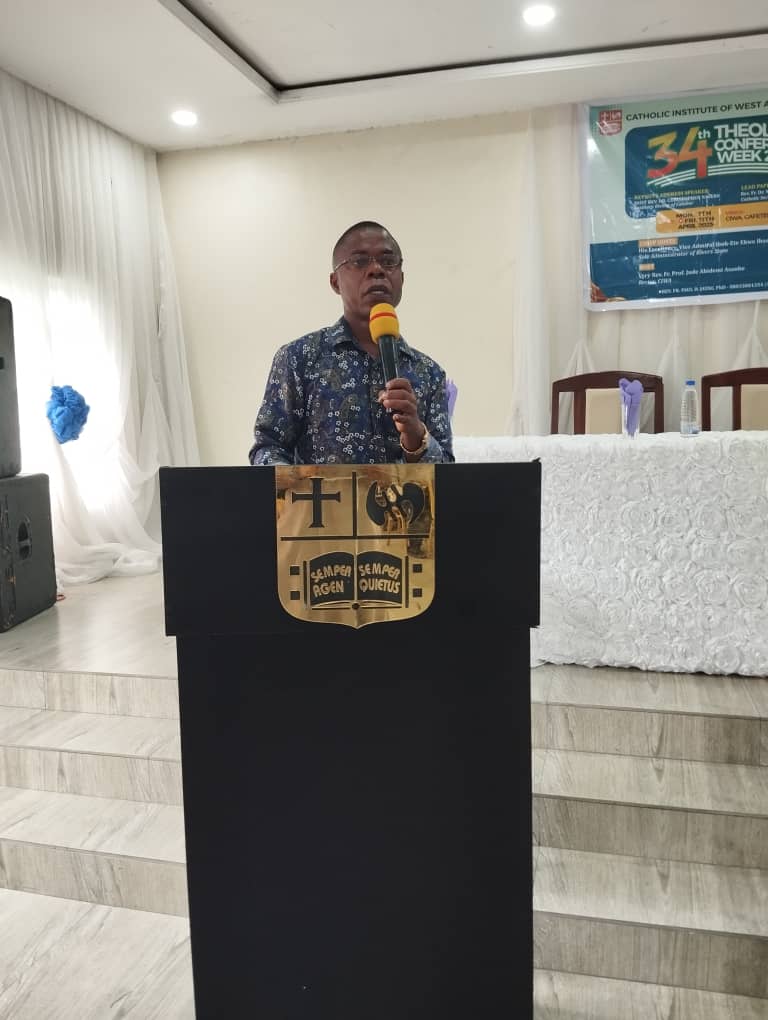Great news: fr. okhueleigbe advocates for an ai that demarginalizes and not one that marginalizes
—April 12, 2025

Port Harcourt, Nigeria, April 10, 2025/Lilian Idungafa & Promise Dickson
In an epoch where the digital winds blow with cyclonic intensity and algorithms inscribe the fate of billions, one voice—gentle yet thundering with prophetic resonance—rises to proclaim a message of hope, healing, and human dignity. That voice belongs to Dr. Okhueleigbe Osemhantie Amos, whose recent scholarly work, “Illuminating Hope Through Artificial Intelligence and Communicative Anthropology,” constitutes a landmark treatise on the ethical reawakening of technology for the benefit of the marginalized.
With the elegance of a seasoned journalist, the discernment of an anthropologist, and the moral clarity of a prophet, Dr. Okhueleigbe extends an invitation to the global Church, academia, and policymakers: to view Artificial Intelligence (AI) not as a cold mechanistic marvel but as a sacramental conduit—a vessel of grace through which the forgotten can be remembered, and the voiceless can sing once more.
“True AI,” writes Okhueleigbe, “is not simply artificial—it is affective, affirming, and anthropocentric. It is hope, coded into the future
What Dr. Okhueleigbe offers is not mere analysis but a scientific theology of inclusion, where AI and Communicative Anthropology are braided into a luminous path that leads from exclusion to embrace, from digital silence to dialogical solidarity. Echoing the Catholic Social Tradition, the study proclaims that technology must be a servant of justice, not a sceptre of domination.
Rooted in Knowledge Gap Theory, the piece unearths a paradox: AI has the dual potential to either widen chasms or bridge them with compassion. This paradox is met not with despair but with discernment. Dr. Okhueleigbe calls for an ethically baptized AI—a participatory framework where the margins are not merely heard but are co-creators in the digital renaissance.
“To exclude the poor from the design table,” the study warns, “is to programme their perpetual silence.”
In ecclesiastical tones reminiscent of Laudato Si’ and Fratelli Tutti, the work exhorts the global Church to move beyond theoretical assent to incarnational action. Digital literacy, grassroots inclusion, and ethically grounded AI systems are no longer luxuries but moral imperatives—sacred duties that reflect the Church’s preferential option for the poor in the 21st century.
Through the lens of Communicative Anthropology, Dr. Okhueleigbe unearths the structures of language, culture, and power that shape human perception. The message is clear: when people are silenced linguistically or digitally, they are exiled existentially. In AI, therefore, lies not only a technological but a theological decision—one that asks: Will this tool reflect the Logos, or will it erase it?
This work sings not only to scholars and developers but to catechists, bishops, NGOs, and every soul concerned with the salvific dignity of the human person. The Church is summoned to baptize code with compassion, to infuse data with dignity, and to ensure that the algorithms of tomorrow are sculpted by the Beatitudes of today.
With characteristic pastoral brilliance, Dr. Okhueleigbe invokes a “theology of hope”—a pneumatology of progress—where every AI policy, every technological deployment, is scrutinized by the question: “Does this glorify God by honoring His image in the poor?”
“We stand,” he writes, “not at the gates of Babylon, but at the edge of a new Jerusalem—where silicon and spirit are reconciled for the flourishing of all.”
Indeed, this magisterial synthesis is not a mere academic endeavour—it is an epiclesis of innovation. It calls down the Holy Spirit upon the field of artificial intelligence, and with the boldness of Vatican II’s Gaudium et Spes, insists that _the joys and hopes, the griefs and anxieties of the poor in a digital age must become the joys and hopes, the griefs and the anxieties of the Church.
This is theology as prophecy. Anthropology as empathy. AI as advocacy. The paper concludes with a luminous exhortation: to forge communities of communion where no one is left behind, and where hope becomes not only a theological virtue but a digital architecture.
In an age dominated by profit margins and processing speeds, Dr. Okhueleigbe’s work is a Eucharistic pause—a breaking of bread that nourishes the soul of civilization. It is a homily for the hacker, a catechesis for the coder, a psalm for the policy-maker.
This is not just great news—it is glorious news. It is not just research—it is revelation.
Related News
September, 07 2025
Ciwa gets new rector
Ciwa gets new rector
July, 08 2025
*the catholic church in nigeria marks years of service amidst mourning*
*the catholic church in nigeria marks years of service amidst mourning*
June, 15 2025
Bishop gerald musa unveils a new vision of evangelisation through sacred imagery at signis africa 2025
Bishop gerald musa unveils a new vision of evangelisation through sacred imagery at signis africa 2025
June, 15 2025
Prof. B. A. C. obeifuna hails ciwa's outstanding scholarship at SIGNIS africa conference
Prof. B. A. C. obeifuna hails ciwa's outstanding scholarship at SIGNIS africa conference
June, 03 2025
Ciwa comweek 2025: a week draped in grandeur, symbolism and spirit
Ciwa comweek 2025: a week draped in grandeur, symbolism and spirit
Upcoming Events
No Upcoming Event posted